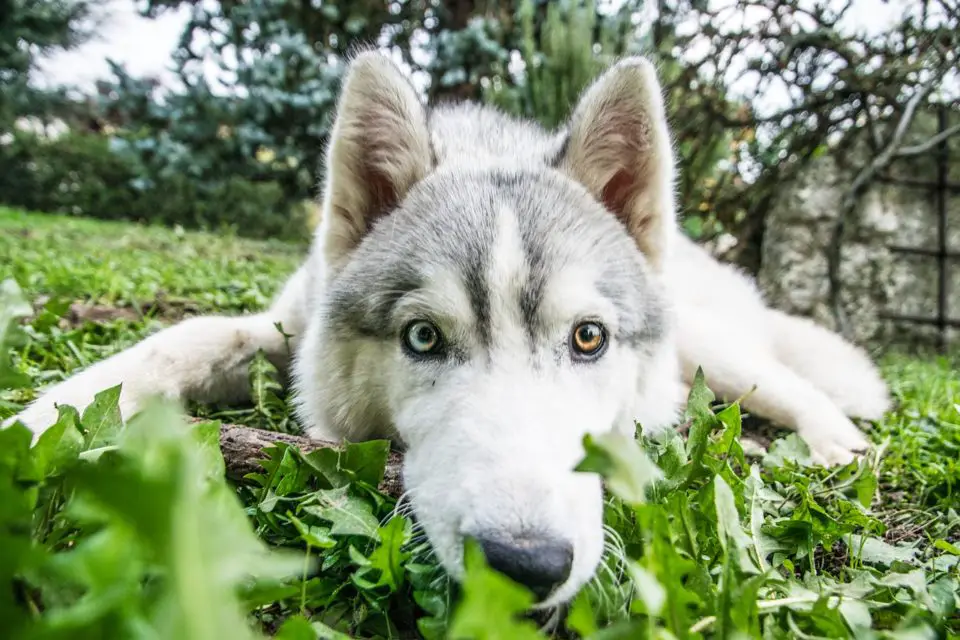I’m Allison, the proud owner of a miniature Schnauzer mix.
I also volunteer at my local community’s animal shelter several times a week.
The majority of the dogs at the shelter are picked up as strays, and Huskies seem to show up fairly regularly. Fortunately, in most cases, these Huskies’ owners come searching for them to take their sweet babies home.
In the occasional instance that the dog’s owner does not come looking, these blue-eyed beauties get adopted out very quickly. And the good news for Huskies is they are adaptable to new families.
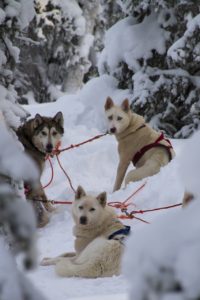
From a practical standpoint, it’s not surprising that huskies are regularly picked up by animal control.
Huskies were historically bred as sled dogs, designed to pull up to 55 pounds per dog for an average of about 20 miles per day.
The need to run is ingrained in the very core of these dogs, so much so that they are escape artists.
Their instincts often take over and they hop the fence – or dig beneath it – so they can be free to run, and run… and run. Once they get out, they don’t easily come back.
Are Huskies Smart?
In researching this topic, I found huskies often made the top 10 lists of the smartest breeds of dogs.
Not only can they pull sleds, they are great at navigating. Some have even been able to find their way home from hundreds of miles away.
That being said, other sites list huskies as being among the least intelligent dogs.
To understand this, we first need to define the term “smart.” Just like in life, with dogs there is “book smart” and then there’s street smart.
In school there are those kids who are just good. They do what they’re told, they work hard, they make good grades, and they become the teacher’s pet. It’s the same with dogs.
There are breeds that live to please people, are easy to train, and get fantastic grades on every “smartest dog” list. These are the types of dogs often selected for service dogs and other important roles where training is imperative.
Going back to the school example, there are also those other kids who may not be as “school smart,” but definitely are not dummies.
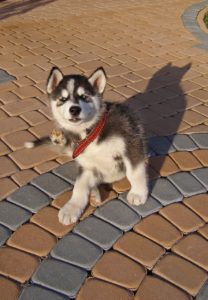
Maybe they don’t do everything that they are told and don’t always make the best grades. Maybe they even get in trouble a lot. These are the kids who don’t just blindly follow orders for no reason. “What’s in it for me?”
When you think about it, in many ways, these kids may actually be smarter than straight “A” students. These are your Siberian Huskies.
Huskies are independent thinkers. They generally don’t do so well in obedience training, but it’s not because they aren’t smart.
It’s because they are so smart that they aren’t going to do what they are told just because they are told to do it. They need to know what’s in it for them, then they’ll decide if it’s worth obeying; a lot of times it’s not.
Huskies are so smart, in fact, that they figure out how to get out of the yard so they can go do what they want to do. They are so smart they probably won’t come running back to you just because you called them.
After all, coming back to you means they don’t get to run free, which is what they want to do.
The key to training a Siberian Husky is to find ways to convince them that it’s in their best interest to obey their owner. They tend to like to see what they can get away with – and often go a little beyond that.
If you would like to help train your strong headed husky check out this article!
They have a unique sense of humor. If you laugh at their disobedience, they are likely going to repeat it.
They may enjoy their owners, but they don’t live to please their owners.
In fact, Siberian Huskies aren’t incredibly loyal dogs. Unlike some breeds that live for their families, Siberian Huskies have places to go and things to do, and they’ll often go along with whoever will get them to where they want to be.
This, again, falls back on their original purpose.
Huskies by nature were not bred to be attached to their owners, but rather to follow their crew leader – which often changed. It’s not unusual for a Husky to up and follow another dog or person.
Do Huskies Make Good Pets?
Huskies can make wonderful pets depending on what you’re wanting to get out of your relationship with your dog.
In fact, Huskies are rated 12th of 193 breeds listed by the American Kennel Club.
As already mentioned, if you want a dog who will follow orders and behave properly in every situation, then no, a husky probably isn’t your best choice.
In general, they aren’t top dog when it comes to service animals – although there have been instances where huskies have made amazing service dogs because they can think through a situation.
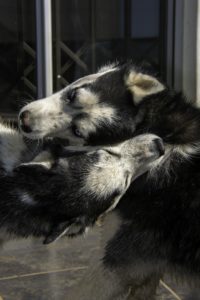 Huskies are bred to have a strong connection with their packs, and they enjoy being with families and generally get along well with other dogs.
Huskies are bred to have a strong connection with their packs, and they enjoy being with families and generally get along well with other dogs.
The downside of this is they do not do well being left alone for extended hours of time. They really need the company of other dogs or human or else they may tear up your home.
If you leave them alone outside, they will likely dig or jump the fence. (A six-foot fence is highly recommended with these dogs.)
Huskies have a strong predatory instinct, which means they have a tendency to chase small animals, and cats or other small pets can be problematic. That is going to depend on the dog and how much training you do with the dog.
If you’re wanting a guard dog, huskies probably aren’t the right answer either.
According to the AKC Standard, the Siberian Husky “does not display the possessive qualities of the guard dog, nor is he overly suspicious of strangers or aggressive with other dogs.”
Don’t be surprised if they just happily wag their tail at the scary stranger lurking around your home.
That being said, Huskies are usually great with children and seem to naturally understand that they must be gentle with young kids.
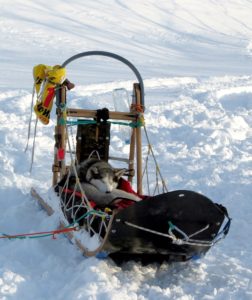
Finally, you have to consider the practical aspect of the breed. These dogs were sled dogs, which mean they were bred to thrive in the freezing cold.
If you live in a hot climate, a Husky may not be the best choice. They also shed a lot year-round. Expect to have dog hair everywhere if you have a Husky. However, Huskies are very clean dogs and naturally have no smelly odors.
Bathing and brushing is recommended at least every 10 to 12 weeks to minimize the overall accumulation of hair.
Additionally, again, Huskies need to run. A home with a yard is best for these dogs. A home with daily access to a neighboring dog park might also do.
They make great running or walking partners as long as it’s not too hot. That being said, they were bred to pull, which can make walking a challenge.
Not only were they bred to pull, they were bred to pull a several times their own weight. They are extremely strong.
Of course, all of this is going to vary by the specific dog, as well as if they Husky is a purebred or mixed with something else.
Overall, Huskies are very friendly, happy, silly, good natured dogs.
If you’re simply wanting a fun-loving, playful, active pup – and you have the means to ensure it receives plenty of exercise – then Huskies can be a great choice for you and your family.
